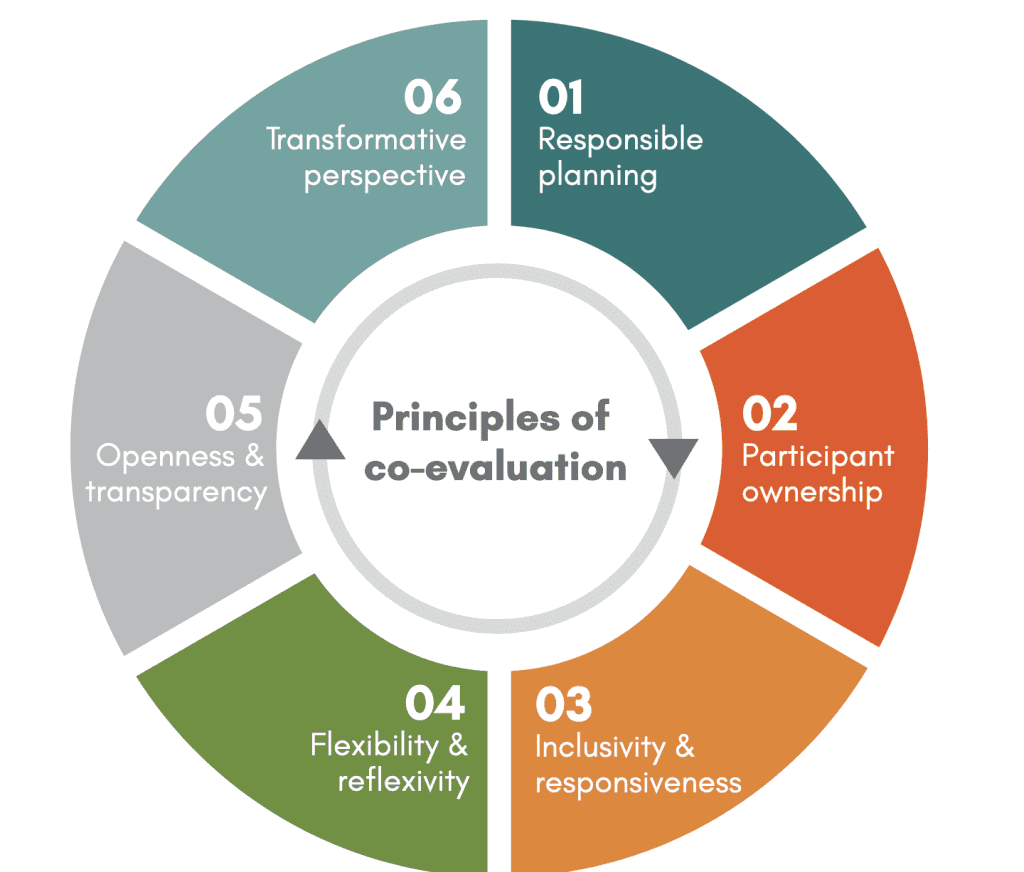Whitepaper on Co-evaluation of Citizen Social Science
This publication is based on the experiences collected over the course of 30 months while implementing participatory evaluation practices in the European funded research project CoAct. This citizen social science project’s primary goal was to address social concerns such as youth employment, mental healthcare, environmental justice and gender equality in the context of local citizen social science initiatives. Based on these experiences, we derived a set of 6 principles that we identified as highly relevant for the implementation of co-evaluation practices in citizen social science.
The initial 6 principles have been shared with the citizen science community to collect feedback during 6 weeks. Here is the revised version that integrates feedback from the public consultation.
6 Principles to guide co-evaluation in citizen social science
“Co-evaluation is very context sensitive and can be implemented in many ways. We believe that there is no cookbook that anyone can deliver to cater to all the different needs in citizen social science. However, a principles-based approach towards co-evaluation can give guidance. Principles – built on evidence – can help to reflect on the complexity of citizen social science and guide an inclusive learning process that may lead to desirable changes” (Kieslinger, Mayer, Schäfer, Schürz)

In accordance with Patton (2010) and Cousins/Whitmore (1998) we consider a set of principles a useful tool that provides guidance especially for projects that are complex, involve many actors and require flexibility and adaptation. This approach stands in contrast to pre-defined evaluation processes that neither allow for the involvement of research participants in the evaluation design nor consider collaborative decision-making structures.
Background information on co-evaluation
Co-evaluation is a form of participatory evaluation that engages stakeholders in a conversation on expectations, objectives and impacts already at the start of the project. Co-evaluation is defined as a process that involves relevant actors of a scientific research project in an iterative evaluation practice applying participatory methodologies. Project goals and objectives, understandings of success, challenges, and unintended effects are collectively discussed and documented at the beginning of a project and regularly re-visited during the research design and execution, ideally even beyond the project’s end. Assessment and intended impacts hence become transparent entities in the project design.
Why co-evaluation?
Co-evaluation takes a transformative stance, as it includes co-creation methods that aim not only at learning about a situation, but also at overcoming hindrances, tackling issues, and finding solutions to problems such as how to measure the success of a research project in terms of stakeholder benefits, putting particular emphasis on marginalised perspectives. The objectives of the co-evaluation are negotiated transparently and are intended to benefit both science and the participants. This means that the results of the co-evaluation also provide useful starting points for further action after the end of the project.
Co-evaluation approaches & methods
Co-evaluation has a strong emphasis on collective discussions, learning, and critical reflection. During the co-evaluation process, which is conducted as a team effort, the assessment procedures and applied methods may vary greatly in their manifestation, depending on the context. They include qualitative and quantitative methods, from surveys to storytelling, being open to any empirical data gathering method, so long as they are appropriate for the respective context and involved actors. Most importantly, co-evaluation is a reflective learning process that involves participants in evaluative decision making. Instead of proposing a set of predefined methods, co-evaluation builds on a set of principles while aiming to adapt the methods to the situative contexts.
More about our understanding and definition of co-evaluation can be found here:
https://zenodo.org/record/6076181#.Yq3o-BNBz0o
https://zenodo.org/record/6107394#.Yq3pLxNBz0o

